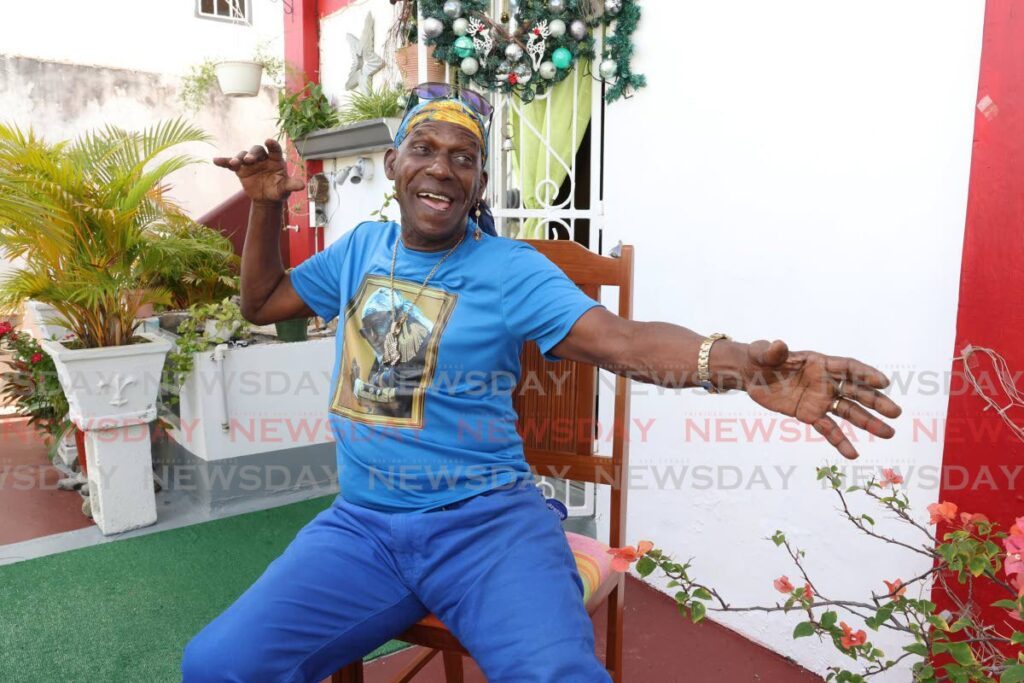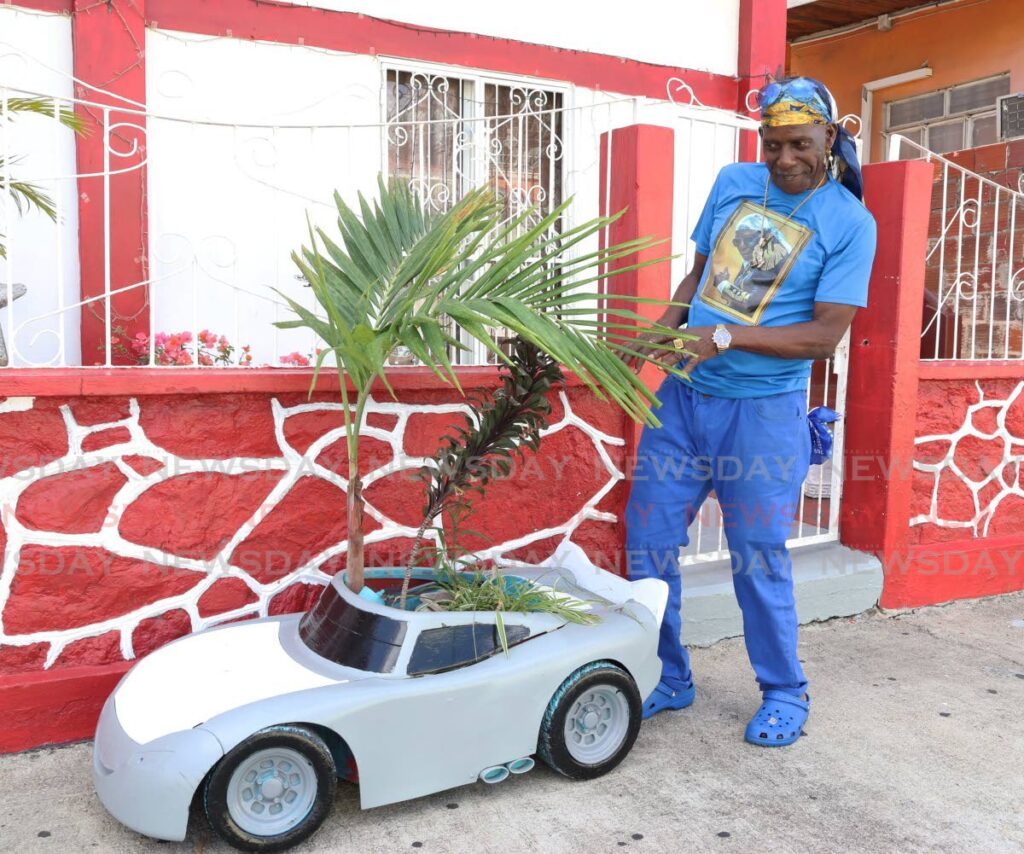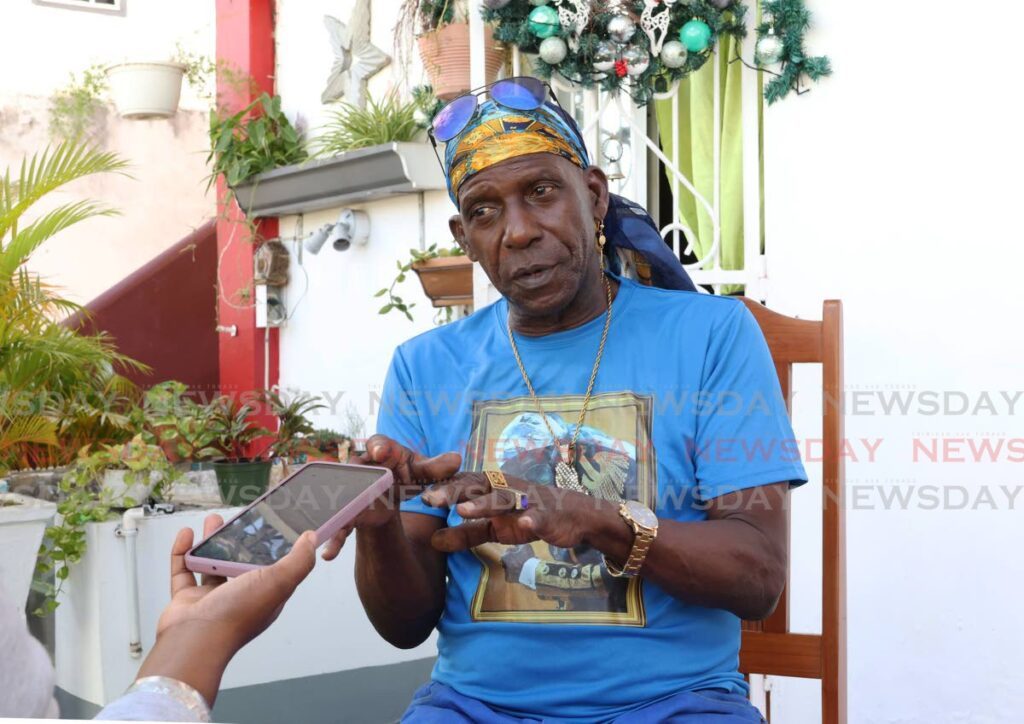SuperBlue’s soca version of history

The lyrics are easy to recall, easy for anyone to sing – but the song’s premise is anything but simple.
Austin “SuperBlue” Lyons and Romell “Smiddy” Smith’s Canboulay Dancers aims to introduce the story of the 1881 and 1884 Canboulay Riots to new generations.
The single was released on December 26. SuperBlue wrote it, Smiddy produced it, and it features live brass by Temperature the Band.
It could never be denied that SuperBlue’s work laid the foundation for today’s soca. Flags waving, people jumping, dust raising and wildly gyrating hips are symbolic of the effects of his music. He has nine Road March titles and six Soca Monarch titles.
In the age of mass media, he continued the work of Sparrow, Kitchener and others by shining greater visibility on the artform, appearing on the TV show Sesame Street and being the first soca artiste to perform at the Wembley Conference Centre in London.
His philosophical approach to music has always been that an artiste is supposed to “inform, educate and entertain.”
He hopes this song will reignite some interest among younger people in TT’s history. He said in an interview at his home at Finland Street, St James, that he would tell them to google and learn about Canboulay.
Canboulay is derived from the French phrase cannes brulées, “burnt cane.” It began as a harvest festival where enslaved people would sing, dance, chant and drum.
After slavery was abolished, freed people took to the streets in celebration, singing, dancing and drumming. The Canboulay festival was eventually incorporated into Carnival. The Idakeda Group re-enacts the riots every year in a Carnival Friday-morning production called Kambule.
The riots happened when colonial police tried to restrict Carnival. There was rioting in San Fernando, Port of Spain and Princes Town, and the brutal suppression led to injuries and fatalities.
The telling of history through song is not new to SuperBlue.
The iconic, trendsetting artiste has previously told history through soca: his 1995 Signal for Lara told the story of cricketer Brian Lara’s record-breaking innings, and 1980’s Soca Baptist immortalised the hypnotic rhythms of Baptist prayer meetings.

He prefers to create songs with a message.
“Why do people go to the tents? To get information, to be educated, to be entertained – and to heal any problems they have.”
Known for his poetic style dipped in TT’s colloquialisms, SuperBlue had worked with Smiddy before and decided to do so again this year.
He would usually work on 14-16 songs for any given Carnival, then decide which was best for him.
“I work with the vibes.”
His method of writing and then choosing songs includes adding pieces to each one until it feels right.
“Smiddy send a riddim for me,” he said and his manager, Danuellia Ramdeen, “was contemplating whether to approach me with it. She had it for four or five days.
“By mistake, she sent something on the phone to me and I hear that." He asked her what it was.
“She say, ‘Well, Smiddy send this to you about five days now…’”
SuperBlue played it on repeat after hearing it, then contacted Smiddy and began working on a song.
The day before he went into the studio, Smiddy told him the riddim’s name: Canboulay.
“I went in the next two days – I had to scrap everything I did initially (because) I didn’t know the riddim name was Canboulay.”
To create the song, SuperBlue visualised what the Canboulay Riots must have been like. He imagined rioters assembling at Piccadilly Street, Port of Spain, armed with flambeaux and candles.
This imagery appears in the single’s video. Against a backdrop of fire, shadowed dancers are seen moving while he sings, “Canboulay dancers, majestic beauty/As far as your eyes can see…/When we on the road/Is an epic episode…”
SuperBlue said he used all the information about the Canboulay Riots and simplified it so it was digestible to most people. The song has received a lot of attention since its release, he said.
“I did it for the children, the elders, for everyone to accept.
“Accidents are not always fatal. In life, there are things called happy accidents, and the Canboulay Riddim was one.”
Carnival elicited “an attitude” from Trinidadians.
“It is not violent. It is one where we want to wine up in a fete and we exaggerate, to a point, everything we do. We exaggerate in feelings.”
He said TT gave the word “Carnival” a more colourful meaning.
“We Carnival is a noun, is a verb, an adjective, and the plural of which is ‘we.’”
He added that it was important for him to use the Queen’s Park Savannah – once the Peschier sugar estate – in the song.
“Now it is the biggest stage in the world and the biggest roundabout in the world.”
SuperBlue said TT’s Carnival was a story of rags to riches, because it grew from something that was considered immoral and socially inappropriate to become a billion-dollar industry.
The infectious nature of TT’s Carnival has now spread throughout the world, he said.
Some have argued Carnival has lost its essence, he does not believe that, saying at one point, TT’s music had been stunted, but had evolved and was everywhere. He recalled that in the past, soca and calypso were not played after Ash Wednesday but that had changed. Ash Wednesday signals the start of Lent (in Christianity, a period of asceticism leading up to Easter) and Carnival music was considered inappropriate for that time.

He added he felt proud to be one of the major architects of what it has become. It has changed tremendously from when the 68-year-old musician first came to Port of Spain at 17 and a half.
“It was problems to make it, to walk from Independence Square to Simeon Road, Petit Valley, I spent six months in the wilderness.
“But I am proud to be affiliated with the word (Carnival) and to the country.”
At this stage in his career, he hopes to pass the music baton on to younger artistes, while ensuring the artform’s continuity.
He also worked with D’All Starz College Boy Jesse on the 2025 single Can’t Live Without You.
He added that he was now trying to work with “all” bands and artistes.
“We have a beautiful artform. Carnival is one of the beautiful, ‘‘theatreristic,’ majestic, lovely things on planet earth and we need to cherish it.
“Carnival is revenue for me and you and we need to keep it beautiful.”
He said he was thankful for the opportunity to be associated with TT’s culture and he would do his best to inspire some younger people also to give it their best.

Comments
"SuperBlue’s soca version of history"